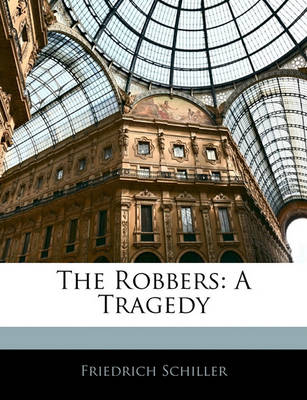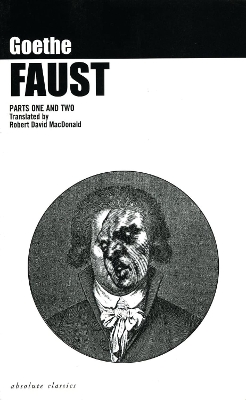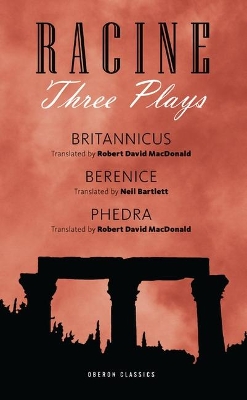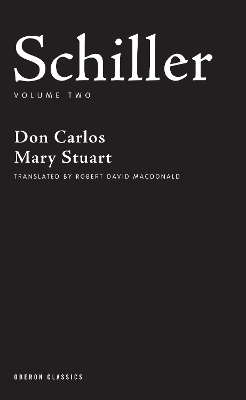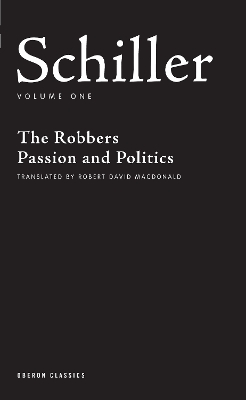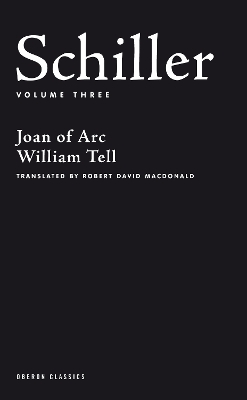Oberon Classics
6 total works
The Robbers (1781) was written in great secrecy under the prison-like conditions of Wurttenberg's Karlsschule: Karl, the son of a count, is disinherited through the machinations of his brother Franz, and, turning his back on a social order he finds unjust and corrupt, becomes the leader of a band of robbers.
Faust: Parts One and Two
by Johann Wolfgang von Goethe and Robert David MacDonald
Published 1 July 1982
The power and magic of the Faust story, the man who, in a pact with the Devil, trades his soul in return for a period of total knowledge and absolute power, is one of the most potent of all European myths. Johann Wolfgang von Goethe (1749-1832) worked on this poetic drama in bursts from his twenties until the end of his life. He reshaped the perpetually fascinating legend, probing the nature and process of human striving and questioning the assumed divisins between the forces of good and evil. His Faust has become a landmark in world literature.
Robert David MacDonald's translation of Faust, used in acclaimed productions in Scotland (Glasgow Citizens') and England (Lyric Hammersmith), offers access to the play in the English language for readers and playgoers alike and opens up the extraordinary range and pace of Goethe's language, rhythms, imagery and ideas, without sacrificing any of the play's humour. The Open University has adopted the translation as a set book for the course entitled 'From Enlightenment to Romanticism'.
Robert David MacDonald's translation of Faust, used in acclaimed productions in Scotland (Glasgow Citizens') and England (Lyric Hammersmith), offers access to the play in the English language for readers and playgoers alike and opens up the extraordinary range and pace of Goethe's language, rhythms, imagery and ideas, without sacrificing any of the play's humour. The Open University has adopted the translation as a set book for the course entitled 'From Enlightenment to Romanticism'.
Racine: Three Plays
by Jean Racine, Neil Bartlett, and Robert David MacDonald
Published 19 November 2010
This work contains three masterpieces by one of the most important French dramatists of the 17th century. "Berenice" is a tale of love and personal happiness in conflict with public duty. "Phedre" concerns a princess with an overwhelming infatuation with her stepson. "Britannicus" lays bare the relationships at the heart of power as a world slips into moral chaos. These new versions by two of the country's most distinguished director-translators prove that Racine is far from untranslatable; they offer blisteringly effective poetry, urgent plotting and powerhouse roles for both actors and actresses.
Includes the plays Don Carlos and Mary Stuart
Major historical upheavals of the Sixteenth Century illuminate Schiller's increasingly troubled reaction to the present in these two plays. The huge epic Don Carlos (1787), a 'play expressing a view of life', marries the ideological battle between Philip II of Spain and his son Don Carlos to a gripping narrative. In Mary Stuart (1800), Schiller, sickened by the excesses of a revolution he had once supported, brings together two monarchs - the English Elizabeth Tudor and the Scottish Mary Stuart, cousins who in reality never met - when Mary, falsely accused of conspiracy, finds herself at Elizabeth's mercy.
Major historical upheavals of the Sixteenth Century illuminate Schiller's increasingly troubled reaction to the present in these two plays. The huge epic Don Carlos (1787), a 'play expressing a view of life', marries the ideological battle between Philip II of Spain and his son Don Carlos to a gripping narrative. In Mary Stuart (1800), Schiller, sickened by the excesses of a revolution he had once supported, brings together two monarchs - the English Elizabeth Tudor and the Scottish Mary Stuart, cousins who in reality never met - when Mary, falsely accused of conspiracy, finds herself at Elizabeth's mercy.
Includes the plays The Robbers and Passion and Politics
Two plays concerned with tyranny and freedom. Schiller's first play, The Robbers (1781), was written in great secrecy under the prison like conditions of Württenberg's Karlsschule: Karl, the son of a count, is disinherited through the machinations of his brother Franz, and, turning his back on a social order he finds unjust and corrupt, becomes the leader of a band of robbers.
In Passion and Politics (1784), a 'bourgeoise tragedy', the love between Louise, a musician's daughter, and Ferdinand, a politician's son, crosses an unbridgeable social divide.
One of the great figures in German literature, Friedrich Schiller (1759-1805) was one of the most significant playwright of his day, numbering among his devotees Coleridge and Carlyle. His plays are known for their originality of form, vivid stage imagery and powerful language, faithfully rendered in Robert David MacDonald's acclaimed translations.
Two plays concerned with tyranny and freedom. Schiller's first play, The Robbers (1781), was written in great secrecy under the prison like conditions of Württenberg's Karlsschule: Karl, the son of a count, is disinherited through the machinations of his brother Franz, and, turning his back on a social order he finds unjust and corrupt, becomes the leader of a band of robbers.
In Passion and Politics (1784), a 'bourgeoise tragedy', the love between Louise, a musician's daughter, and Ferdinand, a politician's son, crosses an unbridgeable social divide.
One of the great figures in German literature, Friedrich Schiller (1759-1805) was one of the most significant playwright of his day, numbering among his devotees Coleridge and Carlyle. His plays are known for their originality of form, vivid stage imagery and powerful language, faithfully rendered in Robert David MacDonald's acclaimed translations.
Includes the plays Joan of Arc and William Tell
Two plays about historical characters whose fame has also raised them to the level of myth. In Joan of Arc (1801), Schiller allows his heroine a more glorious death than her historical execution at the stake, and imbues her with more passion, and compassion, than is usually ascribed to the actual Joan.
In William Tell (1805), often regarded as his greatest play, Schiller creates a vivid sense of time and place - medieval Switzerland - and in his troubled hero, the accidental revolutionary Tell, create a complex and fascinating figure.
One of the great figures in German literature, Friedrich Schiller (1759-1805) was in some ways the most significant playwright of his day, numbering among his devotees Coleridge and Carlyle. His plays are known for their originality of form, vivid stage imagery and powerful language, faithfully rendered in Robert David MacDonald's acclaimed translations
Two plays about historical characters whose fame has also raised them to the level of myth. In Joan of Arc (1801), Schiller allows his heroine a more glorious death than her historical execution at the stake, and imbues her with more passion, and compassion, than is usually ascribed to the actual Joan.
In William Tell (1805), often regarded as his greatest play, Schiller creates a vivid sense of time and place - medieval Switzerland - and in his troubled hero, the accidental revolutionary Tell, create a complex and fascinating figure.
One of the great figures in German literature, Friedrich Schiller (1759-1805) was in some ways the most significant playwright of his day, numbering among his devotees Coleridge and Carlyle. His plays are known for their originality of form, vivid stage imagery and powerful language, faithfully rendered in Robert David MacDonald's acclaimed translations
